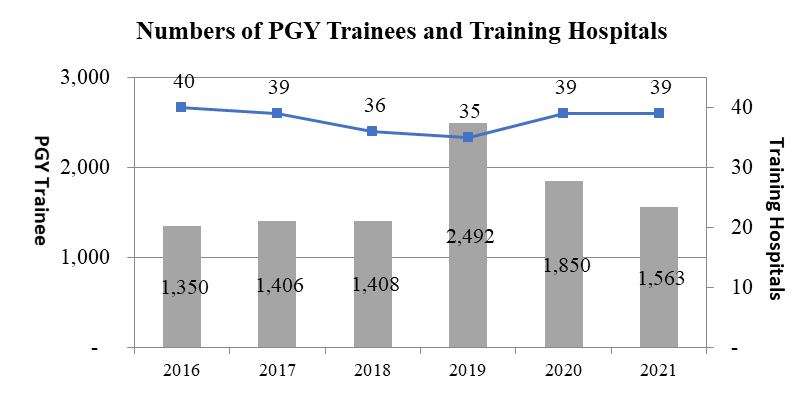Physicians
New medical graduates in Taiwan used to receive organ-focused and disease-oriented specialty training at different departments to develop their specialties and sub-specialty skills. However, the disadvantages of such a system were exposed during the 2003 SARS outbreak. Therefore, the Department of Health proposed the Clinical Education training and Reform Program shortly after the epidemic. In July 2003, the Department of Health officially announced the Post-Graduate Year Program to strengthen the resident physician training system by focusing on the early years of specialty training.
Considering the training capacity, faculty size, and training venue readiness, JCT implemented the program in three stages. The first stage took place between July 2003 and June 2006, where resident physicians were required to receive general medical practice for three months in the first year of their residency. With the support and united effort of hospitals and the general public, the overall teaching atmosphere of hospitals in Taiwan has seen a vast improvement. Thus, the spirit and concepts of the general medicine post-graduate training system began to establish a foundation. The second stage began in July 2006, where post-graduate physicians were enrolled into a 6-month general medicine training designed to lend to curriculum guidelines of specialty training; thus, developing the model for post-graduate general medicine training. The third stage was introduced in July 2011, where postgraduates participated in joint training groups that “focused on the main training hospital” to receive training by the selection system. Now, PGY training has entered a new milestone: new medical graduates are no longer seen as a first-year resident physician of each sub-specialty, but rather a PGY physician.
Since the 2013 academic year, the Ministry of Education has amended the year of study for medical school from seven years to six. Thus, in combination with PGY training for two years after graduation, medical education is designed to have comprehensive planning and outreach by integrating medical education from medical school to clinical training. The JCT implemented this program by the commission of the Ministry of Health and Welfare and conducted a pilot PGY training system (divided into internal medicine, surgery, gynecology, and pediatric training in general medicine) with the collaboration of three medical centers. We believe that medical school graduates will be provided with a rigid, continuous, and united training system from medical school education, post-graduate general training, and specialty training.
Starting in 2019, the first graduates began to receive the 2-year PGY training. Hence, the PGY training system has officially switched from a duration of one to two-years. The training courses aim to strengthen post-graduate physicians’ holistic medical care knowledge and cover practical training for Palliative Care, Geriatrics Medicine, Primary care, etc. The training content also incorporates inter-professional teamwork to lay the foundation for general medicine professionals to collaborate with other specialist physicians training.

Table. Number of PGY Trainees and Training Hospitals
